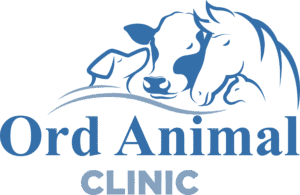Pets are naturally curious, which can sometimes lead them into dangerous situations. Poisoning is a serious risk that can happen at any time, whether from household products, toxic foods, or environmental hazards. Recognizing the early signs of poisoning and knowing how to respond quickly can save your pet’s life. March is Pet Poison Prevention Month, making it the perfect time to educate pet owners on identifying and responding to pet poisoning. At Ord Animal Clinic, we want to help pet owners stay informed and prepared for urgent health situations.
Signs of Poisoning in Pets
Symptoms of poisoning in cats and dogs can vary depending on the toxin, but common signs to watch for include:
- Gastrointestinal Symptoms: Vomiting, diarrhea, drooling, or loss of appetite
- Neurological Symptoms: Tremors, seizures, disorientation, or uncoordinated movements
- Respiratory Issues: Difficulty breathing, coughing, or excessive panting
- Oral Irritation: Pawing at the mouth, foaming, or excessive drooling
- Changes in Heart Rate or Blood Pressure: Rapid or irregular heartbeat, weakness, or collapse
- Unusual Behavior: Agitation, lethargy, or increased thirst and urination
Common Pet Poisons to Avoid
Understanding what substances are harmful can help prevent poisoning incidents.
- Human Medications: Pain relievers, cold medicines, antidepressants, and vitamins can be toxic unless prescribed in a specific dosage by a veterinarian
- Toxic Foods: Chocolate, xylitol (sugar substitute), grapes, onions, garlic, and alcohol can be harmful to pets
- Plants and Lawn Products: Lilies, sago palms, azaleas, and fertilizers with insecticides are highly toxic
- Household Cleaners and Chemicals: Bleach, laundry detergent, antifreeze, and rodenticides pose serious risks if ingested
For a complete list of toxic foods, plants, and household products, visit the ASPCA’s Animal Poison Control website.
What to Do if Your Pet is Poisoned
If you suspect your pet has been poisoned, contact your veterinarian immediately or call a pet poison helpline, such as the ASPCA Animal Poison Control Center or Pet Poison Helpline.
If veterinary care is needed, your vet will ask about what your pet may have ingested and when symptoms started. Bringing in packaging or labels from the suspected toxin can help guide treatment. A physical evaluation, blood tests, or imaging may be used to assess the severity of the poisoning.
Treatment depends on the toxin and symptoms. Your veterinarian may induce vomiting if the toxin was recently swallowed, but never attempt this at home without veterinary approval. Activated charcoal may be used to absorb toxins, and intravenous fluids or medications may be administered to support recovery.
Keeping Your Pet Safe
Recognizing the signs of poisoning and acting quickly can be life-saving for your pet. March is Pet Poison Prevention Month, a great time to learn about potential risks and take steps to prevent exposure to toxic substances. Ord Animal Clinic is here to help you create a safer home environment for your pets.


